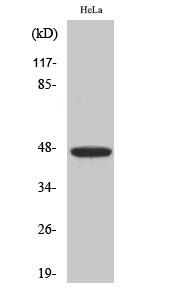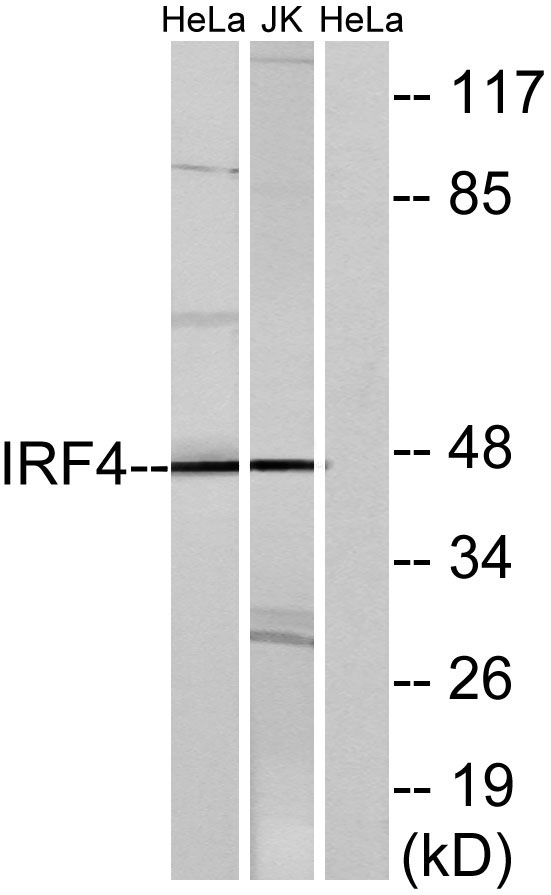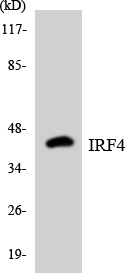IRF-4 Polyclonal Antibody
- Catalog No.:YT2399
- Applications:WB;IHC;IF;ELISA
- Reactivity:Human;Mouse
- Target:
- IRF-4
- Fields:
- >>Th17 cell differentiation
- Gene Name:
- IRF4
- Protein Name:
- Interferon regulatory factor 4
- Human Gene Id:
- 3662
- Human Swiss Prot No:
- Q15306
- Mouse Gene Id:
- 16364
- Mouse Swiss Prot No:
- Q64287
- Immunogen:
- The antiserum was produced against synthesized peptide derived from human IRF4. AA range:281-330
- Specificity:
- IRF-4 Polyclonal Antibody detects endogenous levels of IRF-4 protein.
- Formulation:
- Liquid in PBS containing 50% glycerol, 0.5% BSA and 0.02% sodium azide.
- Source:
- Polyclonal, Rabbit,IgG
- Dilution:
- WB 1:500 - 1:2000. IHC 1:100 - 1:300. IF 1:200 - 1:1000. ELISA: 1:20000. Not yet tested in other applications.
- Purification:
- The antibody was affinity-purified from rabbit antiserum by affinity-chromatography using epitope-specific immunogen.
- Concentration:
- 1 mg/ml
- Storage Stability:
- -15°C to -25°C/1 year(Do not lower than -25°C)
- Other Name:
- IRF4;MUM1;Interferon regulatory factor 4;IRF-4;Lymphocyte-specific interferon regulatory factor;LSIRF;Multiple myeloma oncogene 1;NF-EM5
- Observed Band(KD):
- 45kD
- Background:
- The protein encoded by this gene belongs to the IRF (interferon regulatory factor) family of transcription factors, characterized by an unique tryptophan pentad repeat DNA-binding domain. The IRFs are important in the regulation of interferons in response to infection by virus, and in the regulation of interferon-inducible genes. This family member is lymphocyte specific and negatively regulates Toll-like-receptor (TLR) signaling that is central to the activation of innate and adaptive immune systems. A chromosomal translocation involving this gene and the IgH locus, t(6;14)(p25;q32), may be a cause of multiple myeloma. Alternatively spliced transcript variants have been found for this gene. [provided by RefSeq, Aug 2010],
- Function:
- disease:A chromosomal aberration involving IRF4 may be a cause of multiple myeloma [MIM:254500]. Translocation t(6;14)(p25;q32) with the IgH locus.,function:Transcriptional activator. Binds to the interferon-stimulated response element (ISRE) of the MHC class I promoter. Binds the immunoglobulin lambda light chain enhancer, together with PU.1. Probably plays a role in ISRE-targeted signal transduction mechanisms specific to lymphoid cells.,induction:Not induced by interferons.,similarity:Belongs to the IRF family.,similarity:Contains 1 tryptophan pentad repeat DNA-binding domain.,subunit:Interacts with SPIB and DEF6.,tissue specificity:Lymphoid cells.,
- Subcellular Location:
- Nucleus.
- Expression:
- Lymphoid cells.
Construction and analysis of a ceRNA network and patterns of immune infiltration in chronic rhinosinusitis with nasal polyps: based on data mining and experimental verification WB,IHC Human 1:300,1:1000 CRSwNP tissues/
Inhibition of IL-4/STAT6/IRF4 signaling reduces the epithelial-mesenchymal transition in eosinophilic chronic rhinosinusitis with nasal polyps. Yanjun Wang IHC,IF,WB Human 1:300,1:200,1:1000 nasal polyp tissue
- June 19-2018
- WESTERN IMMUNOBLOTTING PROTOCOL
- June 19-2018
- IMMUNOHISTOCHEMISTRY-PARAFFIN PROTOCOL
- June 19-2018
- IMMUNOFLUORESCENCE PROTOCOL
- September 08-2020
- FLOW-CYTOMEYRT-PROTOCOL
- May 20-2022
- Cell-Based ELISA│解您多样本WB检测之困扰
- July 13-2018
- CELL-BASED-ELISA-PROTOCOL-FOR-ACETYL-PROTEIN
- July 13-2018
- CELL-BASED-ELISA-PROTOCOL-FOR-PHOSPHO-PROTEIN
- July 13-2018
- Antibody-FAQs
- Products Images

- Western Blot analysis of various cells using IRF-4 Polyclonal Antibody

- Immunohistochemical analysis of paraffin-embedded Human brain. Antibody was diluted at 1:100(4° overnight). High-pressure and temperature Tris-EDTA,pH8.0 was used for antigen retrieval. Negetive contrl (right) obtaned from antibody was pre-absorbed by immunogen peptide.

- Western blot analysis of lysates from HeLa and Jurkat cells, using IRF4 Antibody. The lane on the right is blocked with the synthesized peptide.

- Western blot analysis of the lysates from HT-29 cells using IRF4 antibody.



